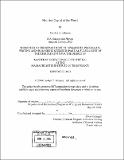Neutrino capital of the world
Author(s)
Johnson, Carolyn Y., 1980-
DownloadFull printable version (2.276Mb)
Other Contributors
MIT Program in Writing & Humanistic Studies.
Advisor
Robert Kanigel.
Terms of use
Metadata
Show full item recordAbstract
Neutrinos are ubiquitous particles, but they don't like to mingle. Each second, billions of them pass through our bodies, slicing imperceptibly through our delicate internal organs. They can barrel through the sun, stars, and planets without a single interaction. Only one in every ten billion of the invisible, chargeless, nearly massless particles will interact through a weak force with another atom, leaving an observable trace of its existence. But in a small town in western South Dakota called Lead (rhymes with 'need'), a 125-year history of mining ore and gold out of the ground may be replaced by these impalpable particles. Lead was the birthplace of neutrino science when chemist Ray Davis began his work on solar neutrinos over thirty years ago. He installed a tank filled with 100,000 gallons of dry cleaning fluid a mile underground in Lead's Homestake mine and began counting neutrino interactions. Eventually, he earned the Nobel Prize for his work; his surprising results changed the world of particle physics. Now that the Homestake mine is closed, scientists, politicians and local citizens have converged on this small town with the hopes of turning it into a national underground laboratory that houses experiments ranging from astrophysics to deep subsurface geobiology. In the process, the state of South Dakota has introduced a unique funding scheme in which science is democratic. Politicians, scientists and regular folks play important roles in the neutrino populist movement, working together to preserve a scientific resource and life in a small town.
Description
Thesis (S.M. in Science Writing)--Massachusetts Institute of Technology, Dept. of Humanities, Program in Writing and Humanistic Studies, 2004. Includes bibliographical references (leaves 22-23).
Date issued
2004Department
MIT Program in Writing & Humanistic StudiesPublisher
Massachusetts Institute of Technology
Keywords
Program in Writing and Humanistic Studies.